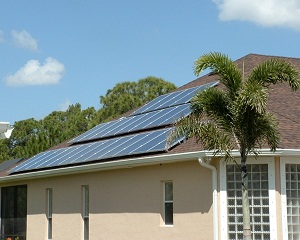Controversy surrounds proposed solar legislation in Florida
 Florida Light & Power (FPL) wants to add more solar in Florida. It just wants to do it its way. FPL is supporting proposed legislation that would increase the amount of solar in the state, but advocates claim that it would give FPL too much control over the solar market.
Florida Light & Power (FPL) wants to add more solar in Florida. It just wants to do it its way. FPL is supporting proposed legislation that would increase the amount of solar in the state, but advocates claim that it would give FPL too much control over the solar market.
The proposed legislation is an attempt by FPL to give control itself and four other large utility companies in Florida “the exclusive right” to develop solar energy in Florida, according to The Miami Herald.
The newspaper also said the legislation would give the utilities the ability to raise rates by more than $2 a month to support their solar projects.
“As a general guideline, the first-year bill impact for an FPL residential customer of an incremental 100 MW of new solar would be approximately 50 cents per month once constructed and in operation. This would decline annually and average about a dime a month over the project's lifetime,” said FPL spokesperson Jackie Robinson.
Though the legislation hasn’t been formally introduced yet, it’s already stirring controversy.
“It’s not what we want,” said Julie Kershner, assistant executive director of the Florida Solar Energy Industries Association (FlaSEIA). “Basically the power companies want to take over solar. As it’s currently drafted, that is the way it’s written.”
FPL refuted The Miami Herald’s allegations.
“Of course not. It doesn't even make sense,”Robinson said. “It is true that we are the largest solar operator in Florida and that the legislation would enable us to build more, but other utilities would be able to build as well, and customers would continue to be allowed to install their own systems.”
“Florida utility customers today can invest in distributed generation, such as rooftop solar panels, and receive credit from their utility for electricity fed into the grid. For Floridians who can afford the cost of their own installations—about $40,000 for a typical 5-kilowatt rooftop solar installation—there are no utility regulations standing in their way,” the utility said.
But FlaSEIA is largely made up of smaller contractors who could be negatively affected by the legislation, Kershner said.
“It’s going to put pretty much all the solar contractors out of business in Florida—except for those that are working to build FPL’s solar plants. But once they’re built, there’s no more solar industry. We are pushing our side,” Kershner said. “It doesn’t sound good. However, It could die and nothing could come out of this.”
Still, the legislation hasn’t made it to the floor on either the Senate or House side.
“It’s still got four more committees to go through [before its introduced on the floor],” Kershner said.
Image courtesy of the Florida Solar Energy Research & Education Foundation.



